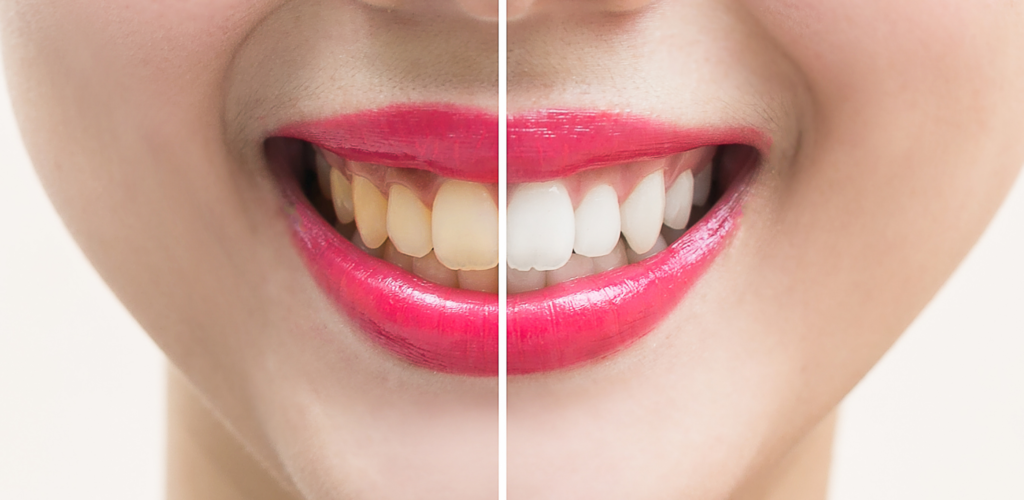Teeth Whitening

As one of the most popular and common cosmetic dental procedures, teeth whitening can greatly improve the appearance of your teeth and mouth by lightening their shade and removing stains and discoloration. That said, and while teeth whitening is a relatively simple procedure that can be repeated over time in order to maintain the desired results, it is not a procedure that one would undertake without any prior planning. Though it is a non-invasive and cosmetic dental procedure, teeth whitening should only be performed once your dentist has confirmed that you are in good oral health and that it can produce the desired results.
Understanding Tooth Color and Stains
Your tooth enamel is the outermost, protective layer of your teeth. Tooth color is created not only by the color of the dentin under the enamel but also by how light is reflected and scattered off the enamel. Obviously, thinner enamel will show more of the darker dentin underneath, but the smoothness of the enamel can also affect its ability to reflect light well and show off a lighter color.
Tooth enamel can pick up and hold stains. Additionally, a thin coating forms over tooth enamel each and every day, and this coating can also pick up stains. This is especially true if one consumes the foods, beverages, and other things that contribute to greater staining, such as tobacco, coffee, cola, tea, and red wine, and if one doesn’t participate in proper oral hygiene habits. Even if one avoids highly pigmented foods and beverages and takes incredible care of their oral health, aging causes enamel to thin and dentin to darken, making teeth appear darker in color.
In some cases, stains occur inside the tooth. These intrinsic stains can result from excessive fluoride exposure as a child, tetracycline antibiotic use during pregnancy or while under the age of eight, and trauma to the mouth and tooth. These types of stains cannot be improved by teeth whitening procedures, which only work on the surface, or extrinsic, stains.
What to Expect
Once you have expressed your interest in receiving teeth whitening, your dentist will first perform a thorough examination to ensure there are no oral health issues that need to be resolved first. Cavities need to be treated and filled so that the whitening solution does not pass through to the inner parts of teeth, and receded gums will expose root areas that will not lighten with whitening procedures. Both of these conditions can also make your teeth sensitive to the whitening procedure.
When your dentist has determined that teeth whitening is appropriate, he will:
- Photograph your teeth. This helps your dentist to monitor your progress and determine whether further whitening is needed to bring about the desired results.
- Gather information about what caused the staining. Along with thoroughly examining your teeth, your dentist will ask you questions in order to better understand what caused the staining and therefore how well your teeth will respond to whitening procedures.
- Clean your teeth. It is important that there are no bacteria, plaque, or food particles on your teeth prior to receiving whitening treatment.
- Apply a substance on your gums. In order to protect your gums against the whitening gel, your dentist will place a protective substance over your gums.
- Place whitening gel on your teeth. The whitening gel contains a sort of bleach that can lighten your teeth and remove stains and discoloration.
- Use a special light to activate the gel. Your dentist has a special light or laser that will activate the gel so that the bleach works faster to bring about its results.

Your dentist will advise you to follow up with him in order to determine just how well the whitening procedure worked for you, and when you will need to return for another whitening procedure. Obviously, abstaining from those things that contribute to staining can help to ensure that each whitening procedure lasts for as long as possible–even as much as six to twelve months. He may also be able to provide you with at-home follow-up treatments that will help to extend the desirable results for as long as is possible.
It is not unusual for individuals to experience some increased tooth sensitivity or gum irritation following a teeth whitening procedure. However, you should always contact your dentist if you are experiencing undesirable effects as a result of teeth whitening.
For more information about teeth whitening and to find out if it’s right for you, Contact Todays Dental Now.
Are you a dentist? Do you want to team up with us?

